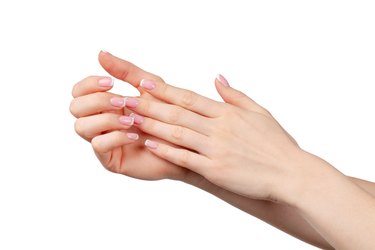
Many people think the cause of nail problems, such as dry or ridged nails, is a vitamin deficiency — but it's not so clear-cut. Your diet can definitely be one reason your nails change from smooth and strong to ridged or flaky, but it's not the only one.
Nail Nutrition Basics
Video of the Day
The first nutrient to consider for healthy nails is protein. "Nails are made from keratin, which is a type of protein, so making sure you get both good quality and also a variety of protein sources in your diet is important," Maria Sylvester Terry, MS, RDN, dietitian and social media manager for Ochsner Health's Eat Fit in New Orleans, says.
Video of the Day
Good protein sources include:
- Lean meats.
- Fish.
- Poultry.
- Eggs.
- Dairy.
However, Sylvester Terry says it's important to also include plant sources of protein. "Plant protein sources such as quinoa, tofu, nuts, seeds and beans tend to be low in saturated fats, while also containing fiber and valuable vitamins and minerals, such as folate and zinc, and the amino acid cysteine that can help nourish your nails."
According to Harvard Health Publishing, a minimum amount of protein to aim for is calculated by your weight in pounds multiplied by 0.36. (So if you weigh 150 pounds, that's 54 grams daily.) Guidelines from the U.S. Department of Agriculture and U.S. Department of Health and Human Services recommend 5 to 7 ounces of protein daily for adults.
Locking in Moisture
The University of Utah says the most common reason nails get ridges or cracks in them is through dehydration. Constantly washing and drying hands and cleaning with household chemicals is a big culprit; but not drinking enough fluids also plays a part.
To stay hydrated, the Mayo Clinic recommends having eight glasses of water per day; this should be enough to make sure your nails don't dry out. But because everyone's fluid requirement is different, it's a good idea to keep an eye on the color of your urine — it should be no darker than a pale yellow color, or you are likely dehydrated.
According to Sylvester Terry, essential fats are also important to keep your nails "moisturized" and flake-free. "A deficiency of these important fats is known to cause dry skin conditions," she says. "Eating a variety of foods such as nuts, seeds, rapeseed and olive oil and avocados — plus fatty fish once or twice a week — will give you all you need."
Signs of Vitamin Deficiency in Nails
Some B vitamins like biotin and folate, as well as vitamin C (which aids the production of collagen), are also important to keep nails generally healthy, according to Sylvester Terry. "A balanced diet will usually meet your needs, but vegans may need to incorporate a vitamin B12 supplement," she says.
A few nail issues can be related to specific nutrient deficiencies. For example, the American Academy of Dermatology Association (AAD) says that thin, spoon-shaped nails can be caused by an iron deficiency. Eating more iron-rich foods will help, but you should get a medical opinion if you suspect you might be anemic.
The AAD also says zinc deficiency may affect nails, resulting in indentations called Beau's lines that run horizontally across nails. The federal Office of Dietary Supplements recommends oysters as a good source of zinc; other good sources are beef, crab and pumpkin seeds.
Beau's lines can also be associated with conditions such as diabetes and vascular disease. It's always wise to assess any big changes in the appearance or texture of your nails with your dermatologist or primary care doctor.
- Maria Sylvester Terry, MS, RDN, dietitian, social media manager, Eat Fit, Ochsner Health, New Orleans
- Harvard Health Publishing: “How Much Protein Do You Need Every Day?”
- U.S. Department of Agriculture and U.S. Department of Health and Human Services: “Dietary Guidelines for Americans 2020-2025"
- University of Utah: “What Can Your Nails Tell You About Your Health?”
- Mayo Clinic: “Water: How Much Should You Drink Every Day?”
- American Academy of Dermatology Association: “12 Nail Changes a Dermatologist Should Examine”
- Office of Dietary Supplements, National Institutes of Health: “Zinc”